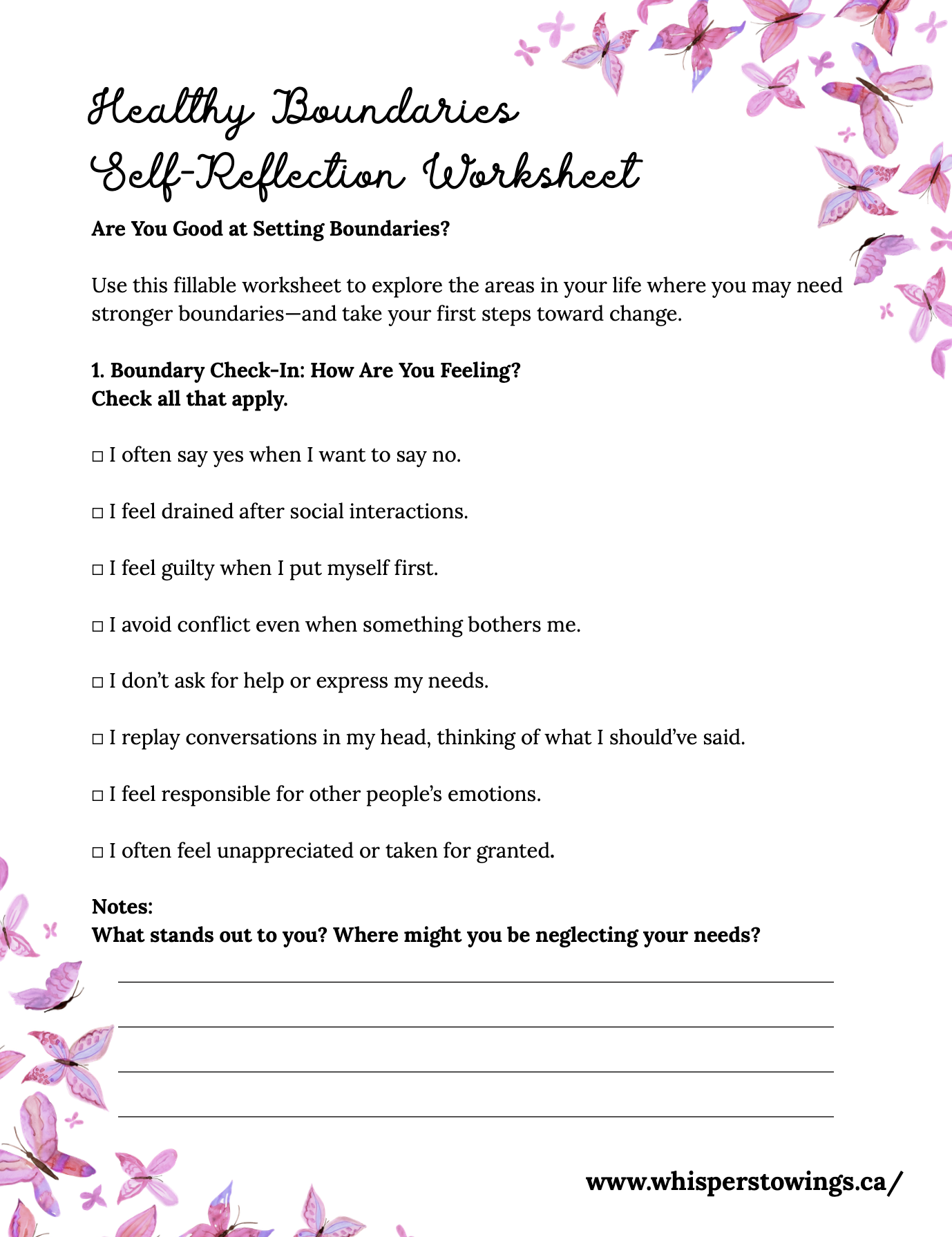Do You Have Difficulty Setting Boundaries?
Setting healthy boundaries is essential for emotional well-being, self-respect, and balanced relationships, but for many people, especially those who have experienced trauma or were raised in environments where their needs weren't prioritized, boundary-setting can be difficult.
This guide will help you reflect on your current boundaries, identify where they may be lacking, and take practical steps toward creating ones that honour your needs.
What Does it Feels Like When You're Not Setting Boundaries?
You may not always notice it at first. But something feels off.
Maybe it’s the exhaustion you carry after every interaction. The resentment that builds quietly beneath your smile. The way you replay conversations in your head, thinking about what you should have said. Maybe it’s how you shrink a little when certain people speak to you—or about you, or how your voice goes quiet when your heart wants to speak loud.
These are signs that your boundaries aren’t being honoured, and more importantly, that you might not be honouring them either.
Before you can make a change, it helps to recognize the signs that your boundaries aren’t being honoured:
You feel drained after conversations or interactions.
You say "yes" when you really want to say "no."
You avoid conflict at all costs, even if it means sacrificing your needs.
You feel responsible for how others feel or behave.
You feel taken for granted or unappreciated.
You often replay situations in your head, thinking of what you should have said.
You feel anxious or resentful before social plans.
You rarely ask for what you need.
If you identify with any of the above, you may be struggling to set or maintain healthy boundaries.
Why It's So Hard to Set Boundaries
Setting boundaries isn’t just about saying "no." It’s about acknowledging that your time, energy, needs, and comfort matter as much as anyone else’s, but there are reasons you might have difficulty setting boundaries.
Childhood trauma or CSA: If you experienced childhood sexual abuse or were raised in an environment where your boundaries were constantly violated, you may have learned that it wasn’t safe to say no, or that your worth was tied to how well you could please others.
People-pleasing: If you often base your value on being liked, helpful, or agreeable, saying no can feel like a threat to your identity.
Fear of rejection or conflict: You may believe that setting boundaries will make people upset with you or cause you to be abandoned.
Cultural or family expectations: You might have grown up with the belief that self-sacrifice is virtuous, or that you should never put yourself first.
Understanding where your resistance comes from is a vital part of healing.
You Deserve Respect—Just Like Anyone Else
It’s easy to believe you should just “suck it up” or “keep the peace,” especially if you were taught, directly or indirectly, that your comfort comes second.
But here’s the truth:
You are allowed to take up space.
Your needs, feelings, and energy matter.
You deserve kindness, respect, and reciprocity.
You shouldn’t have to carry the emotional weight for everyone else.
You don’t have to tolerate people who speak over you or make you feel small.Practical Steps to Start Setting Boundaries
Small Steps to Start Honouring Your Boundaries
1. Start Noticing Pay attention to when your body tenses up, when you feel resentment, or when you feel a pit in your stomach. These are often signs a boundary is being crossed.
2. Delay Your Response You don’t need to give an answer right away. Saying "Let me think about it" gives you time to check in with yourself.
3. Begin With Low-Stakes Situations Practice saying no to small requests, like a favour you're not up for, or plans you don’t have energy for. Small wins build confidence.
4. Use Simple, Clear Language You don’t need to over-explain. Try phrases like:
"That doesn't work for me."
"I'm not available."
"I need some time to myself."
"I'm not comfortable with that."
5. Recognize That Guilt Is Not a Sign You're Doing Something Wrong It's just a sign that you're doing something new. Over time, that discomfort fades.
6. Honour Your Own No Even if no one else hears it. Start by telling the truth to yourself.
7. Make It a Choice Ask: "Is this something I want to do, or something I feel I have to do?" Remember, voluntary choices shouldn’t feel like obligations.
Setting Boundaries in Friendships
Sometimes, the people you care about most may not be respecting your boundaries. This doesn’t always mean they’re toxic—it could simply mean that your relationship has been built on unspoken expectations or one-sided dynamics. When you’ve been giving more than you’re comfortable with for a long time, it can feel incredibly vulnerable to ask for something different. But healthy friendships are based on mutual respect, safety, and emotional honesty.
Start by asking yourself:
Do I feel emotionally safe with this person?
Can I say no without fear?
Do I often leave interactions feeling heavy or anxious?
Do I feel like I can be fully myself?
If the answer is “no” to any of these, it may be time to gently renegotiate the terms of that connection. You can begin by noticing where you feel resentment or dread—those feelings are often clues that a boundary has been crossed or never set in the first place. Start with small conversations. “I’ve been feeling a bit overwhelmed lately, and I need to slow down on plans.” Or, “I’m working on being more honest with myself about what I need, and I’d love your support.”
Real friends will want what’s best for you, and if someone pushes back when you start protecting your peace, it says more about their needs than your worth.
How to Move Beyond the Role of People Pleaser
If you’re naturally a people pleaser, setting boundaries may feel like a betrayal—of your role, your identity, or your sense of safety. People pleasing often begins as a survival strategy. Maybe as a child, keeping others happy helped you avoid conflict, stay connected, or feel useful. But in adulthood, it can leave you overextended, resentful, and disconnected from your true self.
Start with this inner reflection:
What do I believe will happen if I say no?
Do I think my value is tied to what I do for others?
Can I accept that someone might be disappointed?
You might fear that saying no will make you seem selfish, rude, or unkind. But those are old messages, not truths. Saying no is actually an act of honesty—it allows your yes to mean something. It keeps you aligned with your values, energy, and emotional capacity.
To help reframe this, practice this affirmation:
"It is not my job to manage other people’s feelings. My needs matter, too."
You can also practice boundary-setting in low-stakes situations first. Decline a social event you’re not excited about. Ask for more time before making a decision. Pay attention to how your body responds when you honour your limits—you might feel guilt at first, but with practice, you’ll feel lighter, stronger, more you.
Embracing Boundaries as an Act of Self-Respect
Learning to set boundaries isn’t just about protecting yourself from others—it’s about choosing to value your own needs, time, and emotional wellbeing. It’s a process that unfolds slowly, especially if you’ve spent years putting others first or surviving in spaces where your limits weren’t respected.
But every small shift, every pause before saying yes, every honest "no," every moment you check in with yourself, is a step toward greater self-trust and wholeness. Boundaries aren’t walls; they’re invitations to deeper, healthier relationships with others and with yourself. You don’t have to get it perfect. You just have to start.
Start Working on Setting Healthy Boundaries Today!
Download our free 5 page Healthy Boundaries Self Reflection worksheet.


